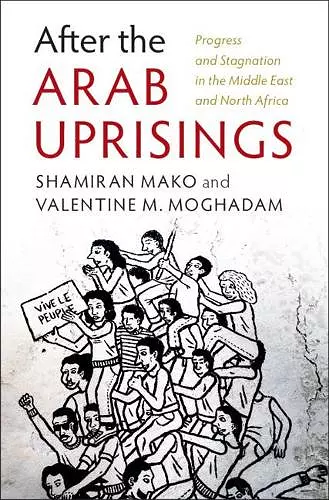After the Arab Uprisings
Progress and Stagnation in the Middle East and North Africa
Valentine M Moghadam author Shamiran Mako author
Format:Paperback
Publisher:Cambridge University Press
Published:22nd Jul '21
Currently unavailable, and unfortunately no date known when it will be back
This paperback is available in another edition too:
- Hardback£73.00(9781108429832)

Provides a holistic and cross-disciplinary approach to understanding why a regional democratic transition did not occur after the Arab Spring protests.
A holistic and cross-disciplinary approach to understanding why a regional democratic transition did not occur after the Arab Spring protests, this accessible study highlights the salience of regime type, civil society, women's mobilizations, and external intervention across seven countries for undergraduate and postgraduate students and scholars.Why were some, but not all the Arab mass social protests of 2011 accompanied by relatively quick and nonviolent outcomes in the direction of regime change, democracy, and social transformation? Why was a democratic transition limited to Tunisia, and why did region-wide democratization not occur? After the Arab Uprisings offers an explanatory framework to answer these central questions, based on four key themes: state and regime type, civil society, gender relations and women's mobilizations, and external influence. Applying these to seven cases: Tunisia, Egypt, Morocco, Bahrain, Libya, Syria, and Yemen, Valentine M. Moghadam and Shamiran Mako highlight the salience of domestic and external factors and forces, uniquely presenting women's legal status, social positions, and organizational capacity, along with the presence or absence of external intervention, as key elements in explaining the divergent outcomes of the Arab Spring uprisings, and extending the analysis to the present day.
'In their sweeping comparative analysis of the divergent outcomes of the Arab Spring, Mako and Moghadam not only highlight the importance of women's activism; they prove it was a fundamental determinant of those outcomes. This is a novel and powerful analysis that will be essential for understanding MENA since 2010.' Jack A. Goldstone, George Mason University
'A brilliant multi-level and cross-national study of why the Arab Spring resulted in dramatically different outcomes for the Arab countries involved. Fine-grained top down and granular bottom up analyses of the causes of violent versus nonviolent responses to legitimate protests. Critical insights into lessons for democratic possibilities /or authoritarian regime pathways in a vital and contested region of the world. Must read for students of history and the Middle East.' Suad Joseph, University of California, Davis
'Mako and Moghadam present an expansive and thought-provoking analysis of the Arab uprisings and their aftermath that, unlike many studies, pays careful attention to factors that others skim over or else entirely ignore. In addition to the role of diverse civil society organization and the role of women, they center the role of external actors in shaping the direction and outcome of the individual uprisings. This theoretically and empirically rich analysis will be a must read not only for scholars of the Middle East, but for the fields of social movements, democratization, and contentious politics as well.' Jillian Schwedler, City University of New York
'a bracing assessment of revolution, repression, and war … The book stands to inform a broad range of academics and nonspecialists seeking to understand how the Arab world has changed - sometimes for better, often for worse - and where the region is headed.' Jason M. Brownlee, The Middle East Journal
ISBN: 9781108454797
Dimensions: 230mm x 153mm x 16mm
Weight: 460g
308 pages